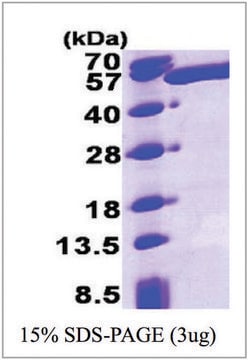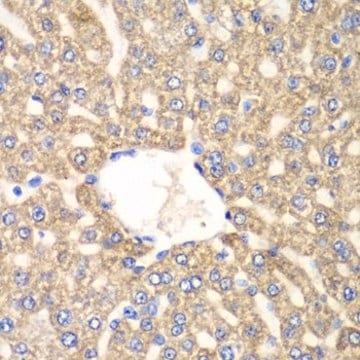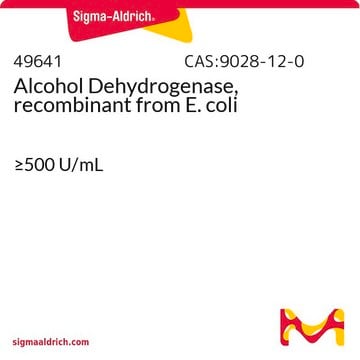SRP6083
ALDH2 human
recombinant, expressed in E. coli, ≥90% (SDS-PAGE)
Synonym(s):
ALDH class 2, ALDH-E2, ALDHI, ALDM, Aldehyde dehydrogenase, mitochondrial
Sign Into View Organizational & Contract Pricing
All Photos(1)
About This Item
UNSPSC Code:
12352204
NACRES:
NA.32
Recommended Products
biological source
human
recombinant
expressed in E. coli
Assay
≥90% (SDS-PAGE)
form
liquid
mol wt
54.5 kDa
packaging
pkg of 100 μg
NCBI accession no.
shipped in
dry ice
storage temp.
−70°C
Gene Information
human ... ALDH2(217)
General description
ALDH2 (Aldehyde dehydrogenase 2 family) belongs to the aldehyde dehydrogenase family which catalyze the chemical transformation from acetaldehyde to acetic acid and is the second enzyme of the major oxidative pathway of alcohol metabolism. There are two major liver isoforms of this enzyme, cytosolic and mitochondrial, and they can be also distinguished by their electrophoretic mobilities, kinetic properties, and subcellular localizations. ALDH2 has been shown to interact with GroEL.
ALDH2 (Aldehyde dehydrogenase 2 family) belongs to the aldehyde dehydrogenase family. There are two major liver isoforms of liver aldehyde dehydrogenase, cytosolic (ALDH1) and mitochondrial (ALDH2), and they can be distinguished by their electrophoretic mobilities, kinetic properties, and subcellular localizations.
The ALDH2 gene is mapped to human chromosome 12q24.12.
Biochem/physiol Actions
Aldehyde dehydrogenases catalyze the chemical transformation from acetaldehyde to acetic acid and ALDH2 (Aldehyde dehydrogenase 2 family) is the major enzyme of the oxidative pathway of alcohol metabolism. Overexpression of ALDH2 inhibits cell injury induced by acetaldehyde and prevents activation of stress signals.
It is actively involved in the metabolism of both endogenous and exogenous substances.
Physical form
1 mg/mL solution in 20 mM Tris-HCl buffer (pH 7.5) containing 1 mM DTT, 1 mM EDTA and 10% glycerol.
Preparation Note
Centrifuge the vial prior to opening.
Other Notes
MSAAATQAVP APNQQPEVFC NQIFINNEWH DAVSRKTFPT VNPSTGEVIC QVAEGDKEDV DKAVKAARAA FQLGSPWRRM DASHRGRLLN RLADLIERDR TYLAALETLD NGKPYVISYL VDLDMVLKCL RYYAGWADKY HGKTIPIDGD FFSYTRHEPV GVCGQIIPWN FPLLMQAWKL GPALATGNVV VMKVAEQTPL TALYVANLIK EAGFPPGVVN IVPGFGPTAG AAIASHEDVD KVAFTGSTEI GRVIQVAAGS SNLKRVTLEL GGKSPNIIMS DADMDWAVEQ AHFALFFNQG QCCCAGSRTF VQEDIYDEFV ERSVARAKSR VVGNPFDSKT EQGPQVDETQ FKKILGYINT GKQEGAKLLC GGGIAADRGY FIQPTVFGDV QDGMTIAKEE IFGPVMQILK FKTIEEVVGR ANNSTYGLAA AVFTKDLDKA NYLSQALQAG TVWVNCYDVF GAQSPFGGYK MSGSGRELGE YGLQAYTEVK TVTVKVPQKN S
Signal Word
Warning
Hazard Statements
Precautionary Statements
Hazard Classifications
Eye Irrit. 2
Storage Class Code
11 - Combustible Solids
WGK
WGK 3
Flash Point(F)
Not applicable
Flash Point(C)
Not applicable
Certificates of Analysis (COA)
Search for Certificates of Analysis (COA) by entering the products Lot/Batch Number. Lot and Batch Numbers can be found on a product’s label following the words ‘Lot’ or ‘Batch’.
Already Own This Product?
Find documentation for the products that you have recently purchased in the Document Library.
Overexpression of aldehyde dehydrogenase-2 (ALDH2) transgene prevents acetaldehyde-induced cell injury in human umbilical vein endothelial cells: role of ERK and p38 mitogen-activated protein kinase.
Li SY
The Journal of Biological Chemistry, 279, 11244-11252 (2004)
Aishwarya Nene et al.
Journal of biomedical science, 24(1), 3-3 (2017-01-07)
Mitochondrial aldehyde dehydrogenase 2 (ALDH2) is a key enzyme for the metabolism of many toxic aldehydes such as acetaldehyde, derived from alcohol drinking, and 4HNE, an oxidative stress-derived lipid peroxidation aldehyde. Post-translational enhancement of ALDH2 activity can be achieved by
Cloning of cDNAs for human aldehyde dehydrogenases 1 and 2.
Hsu LC
Proceedings of the National Academy of Sciences of the USA, 82, 3771-3775 (1985)
Direct detection of usual and atypical alleles on the human aldehyde dehydrogenase-2 (ALDH2) locus
Hsu LC
American Journal of Human Genetics, 41, 996-1001 (1987)
Significant association between decreased ALDH2 activity and increased sensitivity to genotoxic effects in workers occupationally exposed to styrene.
Weng Z, et al.
Oncotarget, 7(25), 38224-38224 (2016)
Our team of scientists has experience in all areas of research including Life Science, Material Science, Chemical Synthesis, Chromatography, Analytical and many others.
Contact Technical Service









